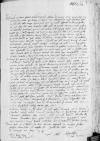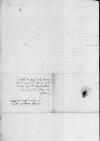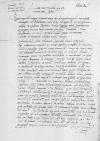Adhuc hic maneo veluti carceratus et non licet hinc abire, nisi habita provisione.
Iam debitor sum in duc(atos) respective centum et quanto plus tanto magis. Nescio quid agitur, quod nullum responsum hactenus habui, nec pro illis litteris, quas ⌊Neapolim⌋ misi. Certum est, quod hic mercatores erant avisati, de aliquibus pecuniis pro me, sed nondum erant cambii cedulae, nescio, ubi haerent. Scripsi ego ⌊serenissimae maiestati reginali⌋ sub dat(o) 1530-05-23⌊13 Maii1530-05-23⌋ cum litteris illis vestris et scio, quod illi mercatores per illum mensem Maium illuc pervenerunt, et iam ⌊Viennae⌋ visi sunt. Quod si ⌊sua maiestas⌋ me hinc redimere non curaret, scripsi fratribus meis, ut fructibus beneficiorum meorum tanti quanti venditis, redimant me hinc ducentis ducatis. Illi omnino non tardabunt. Interim patiar. Utcumque tamen veniam ego ad Magnificentiam Vestram in ⌊Augustam⌋ et omnino hoc mense Iunio discedam, si manibus et pedibus serpendum sit, et illas expeditiones ac quidquid horum erit mecum capiam, prout vult et committit ⌊sua maiestas⌋. Proinde Magnificentia Vestra retineat apud se illa omnia, quae transmittenda erunt et interea tentabit aliquid de ⌊Monte Serico⌋ secundum hanc informationem, quam mitto.
Audimus hic mortuum dominum ⌊cancellarium magnum⌋, quod dolet mihi plurimum. Non cito talem virum habebimus. Audimus quoque ⌊regem Galliae⌋ falsam monetam ⌊caesari⌋ misisse et rursum pacta violasse, ac ⌊regulum Navarrae⌋ in ⌊Sabaudiam⌋ et consequenter ⌊Genuam⌋ cum XXV milibus
cf. Petr. 45.11.3-4 occidit de lucerna equites, putares eos gallos gallinaceos; Petr. 86.1.3 gallos gallinaceos pugnacissimos ⌊Gallorum Gallinaceorumcf. Petr. 45.11.3-4 occidit de lucerna equites, putares eos gallos gallinaceos; Petr. 86.1.3 gallos gallinaceos pugnacissimos ⌋ minasse ad replendas illas fossas, hoc illud esset, quod cecinit optimus vates. Negat hoc is orator ⌊Gallorum⌋, qui hic est, quem dicunt aliquotiens iam secrete alloqutum fore nuntium ⌊imperatoris Thurcarum⌋, qui huc non pridem venit et hanc credentiam in ⌊senatu⌋ habuit, cuius exemplar mitto ex Italo in Latinum translatum. Habet hic aliud sub cortice, venit explorare res Christianorum post hanc concordiam eorum, et si non erunt illi impedimento per mare grassare volenti.
Venit ms. Veneti(!)
⌈VenitVenit ms. Veneti(!)
⌉[2] hic murmur de peste et nullae erant caerimoniae in festo Corporis Christi[3], nec ipsa processio, quod non caret maxima suspitione. Debuerant hic ⌊Venetias⌋ convenire duces ⌊Ferrariae⌋, ⌊Mantuae⌋, ⌊Mediolani⌋ et alii plures domini pro certis spectaculis navalibus, qualia autem non visa nec audita fuerant, sed haec pestis hanc spem conturbat. Dicunt mortuum ⌊ducem Mediolani⌋ illum, qui fuit in ⌊Francia⌋, ⌊marchionem quoque de Monferati⌋. Heri Alexander ille abiit cum VII canibus. Timeo, ne eum decomedant, si parcus illis erit. Vadit ad ⌊Isbruk⌋, tandem aqua usque ⌊caesarem⌋.
Salutat Magnificentiam Vestram frater meus et ⌊fratrem vestrum Bernardum⌋ ac dominum ⌊Drevicium⌋ cancellarium ms. Canciler(um)(!)
⌈cancellariumcancellarium ms. Canciler(um)(!)
⌉ uterque nostrum. Venerunt hic socii sui domini de Conari et vadunt ⌊Bononiam⌋ studiare. Rogo Magnificentiam Vestram, si quid litterarum ad me ibi venerit, remittat huc, quia aliquid forte erit de provisione mea. Quod si committetur aliquid ⌊dominis Welseris⌋, hic mihi mitterent cedulas cambii.
Parcat Magnificentia Vestra celeritatem, is senex ita erat impatiens, ut vix haec scribere permisit, bene bibit et morosus est. Commendo me Magnificentiae Vetrae.




 UUB, H. 154, f. 22v
UUB, H. 154, f. 22v